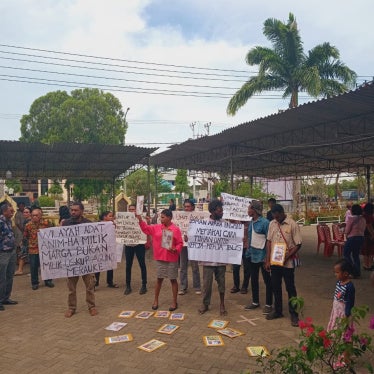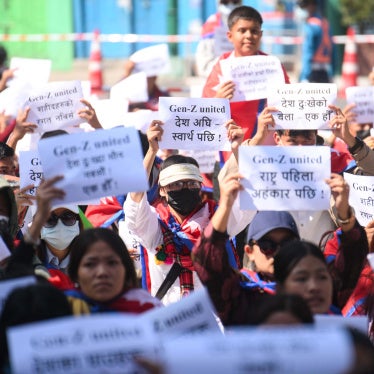We were selling out to the "Evil Empire," said some commentators when the Helsinki Accords were signed 25 years ago. We were countenancing Soviet domination over Eastern Europe and putting our faith in a treaty's frail commitments to observe human rights. The fact that 35 European and other countries signed the accords--including the United States, the Soviet Union and Canada--made it an even bigger target for criticism. What could a piece of paper do to stop the menace of communism?
Quite a lot, as it turned out. The Helsinki Accords inspired dissidents within the Soviet bloc to challenge their governments openly, to champion the causes of free speech, free association and other basic human rights. That challenge and those values are what brought down the Berlin Wall. Nearly 10 years after the breakup of the Soviet empire, most citizens of former East Bloc countries enjoy the freedoms inscribed in the Helsinki Final Act.
The most glaring exception: the residents of the five Central Asian republics--"the Stans"--which suffer under authoritarian regimes that are arguably worse than the old Soviet Union. The United States should be doing much more to counteract the worsening authoritarian trend.
These are states without politics, where former communist leaders have clung to power by silencing, jailing or exiling the political opposition groups that flowered in the early 1990s. Elections in each have grown steadily more farcical over the course of the decade: Uzbekistan President Islam Karimov's state-sponsored rival in the January presidential ballot admitted casting his own vote for the incumbent, "in order to save democracy." Kyrgyzstan President Askar Akaev is disqualifying his potential opponents in the vote this October by orchestrating trumped-up criminal charges against them--a tactic that President Nursultan Nazarbaev of Kazakhstan has also used repeatedly. And President Saparmurad Niazov of Turkmenistan, who calls himself Turkmenbashi--"head of the Turkmen"--has dispensed with the need for presidential elections entirely by having himself declared president for life.
The state of civil rights in Central Asia is little better. Police in all five countries extract bribes and confessions through systematic torture, while in Tajikistan, armed criminal gangs linked to the government terrorize the population unchecked. Free expression is unheard of, and each state has thwarted the growth of civil society to varying degrees. Religious freedom, too, continues to suffer: Most of the countries have enacted laws on religion more stringent than that of the old Soviet Union. In Turkmenistan, faiths other than Russian Orthodoxy and mainstream Sunni Islam are criminalized. And in Uzbekistan, thousands of observant Muslims who avoid the state-controlled mosques have been sentenced to long prison terms for "anti-state activity."
Limited market "reforms" in each country have amounted to little more than the license for those in power to loot state assets, as the recent U.S. Justice Department investigation of accounts linked to President Nazarbaev of Kazakhstan makes clear. The International Monetary Fund recently stated that $600 million to $800 million annually is spirited out of Uzbekistan, a country with supposedly strict foreign exchange controls.
Twenty-five years after Helsinki, human rights activists in Central Asia encounter repression as harsh as any Czech or Polish dissident ever faced. But while the West lionized anti-communist agitators, it pays little attention to the Central Asian men and women who are exiled, jailed and tortured.
The United States has cozied up to Central Asia's authoritarian rulers, eager to secure access to oil and gas, and to outmaneuver Russia as the regional heavyweight. Washington may issue perfunctory criticism of the Central Asian states' human rights records, but the money keeps flowing nonetheless. The Clinton administration has been unwilling to stand by its obligations under U.S. law to restrict assistance to some of these countries as gross violators of human rights. This has involved some shameful whitewashing. To maintain the Cooperative Threat Reduction program, the administration certified Uzbekistan as "committed to human rights"--even though the Uzbek government imprisons people for up to 20 years for distributing Islamic leaflets. These repressive policies, supposedly designed to undermine the politicization of Islam, have in fact contributed to it.
The Organization for Security and Cooperation in Europe (OSCE) is the heir to the Helsinki process. After the Cold War, the OSCE was expressly mandated to help guide the states of Central Asia through a democratic transition. In fact, the OSCE has resisted throwing its weight behind criticisms of serious violations of human rights. It is not living up to the spirit of Helsinki.
U.S. policy since the end of the Cold War has focused obsessively on safeguarding the "independence" of the Central Asian states from Moscow. But let's remember why that independence from the Soviet Union was so ardently sought. Moscow ruled the republics with an iron hand and denied people basic human rights. Now the people of Central Asia have merely traded one iron hand for another. They've got nothing to celebrate on this 25th anniversary.
Cassandra Cavanaugh is Central Asia Researcher for Human Rights Watch.








